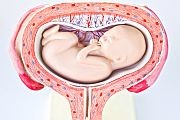Tag: Autism
C-Section, Autism Spectrum Disorder Link Questioned
No correlation seen for elective, emergency cesarean section in sibling control analysis
Parental Age Factors Linked to Autism Risk
Greater odds in children of teenage mothers, older mothers, and parents with big age gap
Special Diets, Supplements May Be Counterproductive in ASD
These interventions are often tied to either too little or too much of certain nutrients
More Reassurance Against MMR-Autism Link
Finding held true even for children at risk for the developmental disorder
Parent Training Program Can Improve Child Behavior in Autism
Behavior management strategies appear to make a difference, researchers found
Response to Parental Concerns of Autism Found Lacking
Early diagnosis is associated with better long-term outcomes
Gestational Diabetes May Increase Risk of Autism
High blood glucose might interfere with normal brain development, researcher says
Assisted Reproductive Technology Linked to Autism
Correlation mainly explained by adverse prenatal and perinatal outcomes; multiple births
AMA Provides Key Messages for Patients About Vaccination
Physicians should be prepared for patients to ask questions about MMR and link to autism
Video-Based Tx May Benefit Babies at Risk for Autism
Research suggests an effect for at-risk infants, but more study is needed














